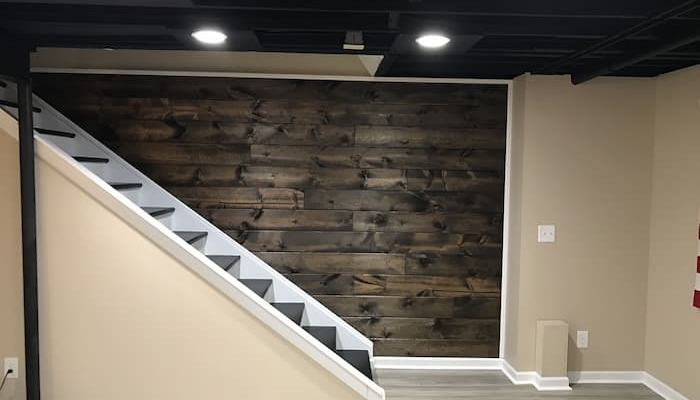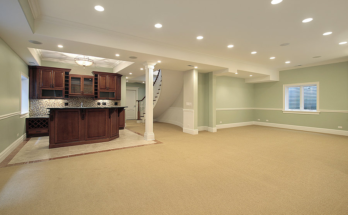You enjoy efficiently entering the chamber through the basement stairs. Although basements are not often the most visited rooms in a home, it is vital to be aware of the key principles that will help you organize a nice basement with easy access whenever needed. Therefore homeowners need to know how to finish basement stairs. It is crucial to comprehend the staircase’s structure since it will help you create a sturdy staircase suitable for your basement and to your taste by understanding how each component works and supports the others. Protecting basement stairs from foot traffic and moisture is necessary. Many fantastic alternatives available when determining how to finish basement stairs.
A basement stairway’s quality typically corresponds to that of the basement itself. A straight, steep staircase with exposed treads or even a spiral staircase can be found in an unfinished basement largely used for storage. Even though basement stairs are rarely utilized and hardly ever visible in homes, it is essential to understand the significance of how to finish basement stairs. Typically, a finished basement has a more elaborate staircase with closed treads and perhaps even a landing. A basement staircase almost typically serves more practical purposes than aesthetic ones. It indicates that it is usually built of wood or plywood, without elaborate decorations or long treads. In this blog, we’ll talk about how to finish basement stairs for your perfect home guidance.
Natural fiber carpet is a common finishing choice for upper-story staircases, but it cannot be used in a conventional basement due to the temperature. However, you can also use fake carpets. But because it’s simple and affordable, the majority of consumers will pick a paintable finish. There are several ways how to finish basement stairs. Although both are slippery, paint and clear finishes can also look fantastic. It makes sense to exert additional effort to remedy this problem in the interest of safety.
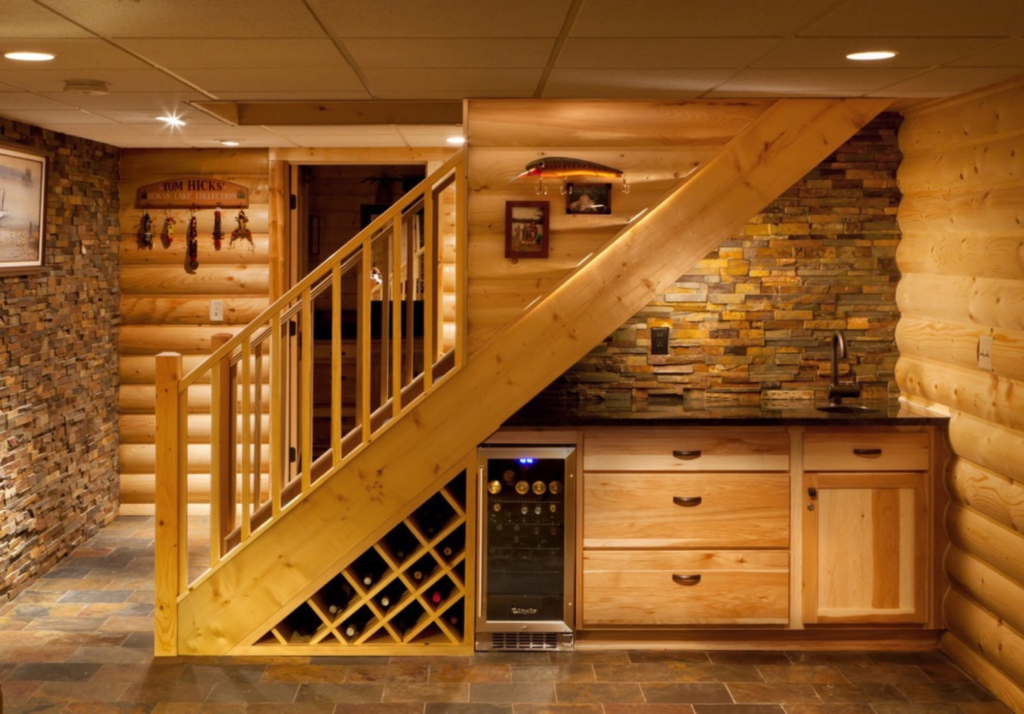
Don’t let the idea of remodeling your staircase overwhelm you. Finishing them isn’t difficult because their core structures have already been established. Your steps may currently have worn treads and exposed threads, making them look shabby. It won’t take much effort to achieve a straightforward result. Before applying the finish to an unfinished basement staircase, undertake a thorough inspection to find out what else has to be fixed. Let’s clarify a few things about how to finish basement stairs.
Basics to Note
Consider the following when you plan to finish your basement staircase.
- Stuff: The most popular materials for treads, risers, and rails are pine, fir, and oak. All of them require paint or a sturdy clear finish.
- Space: The area between each tread can be left empty, typical for outside staircases. It can be filled in with a wooden riser. Treads and risers must be completed simultaneously.
- Nosing: The front edge of wood treads is normally rounded and is known as the nosing. The nosing is frequently required when completing a plywood staircase with hardwood.
- Handrail: Most basement staircases have a handrail on one side and hug the wall on the other. Typically, the railing is not ornate, but it can be. In either scenario, it must be finished concurrently with the staircase.
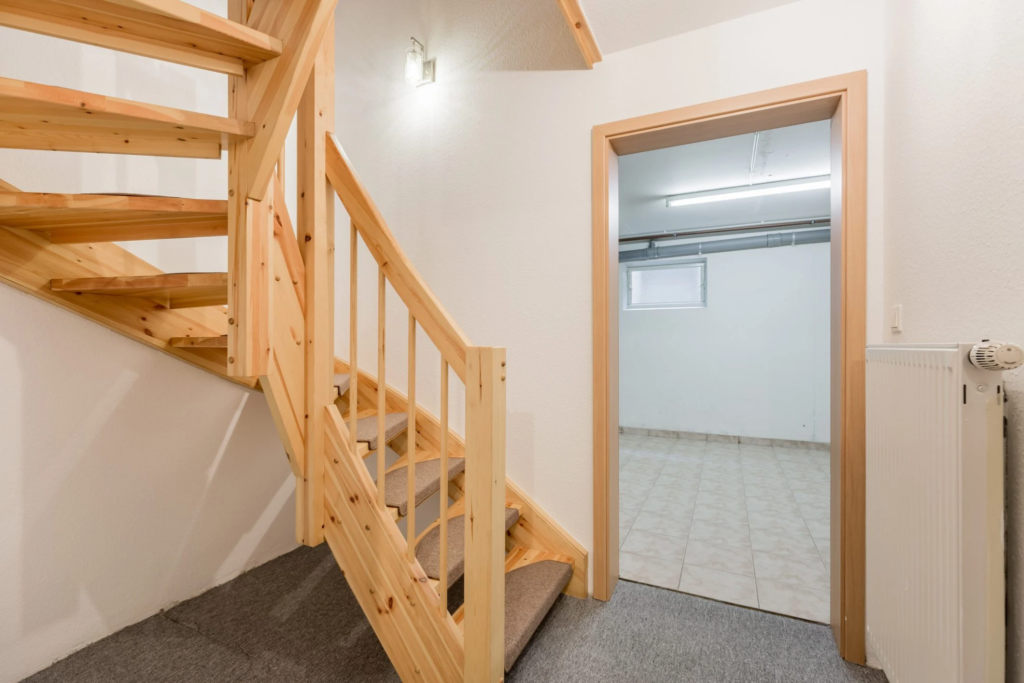
What to take into account when Finish Basement Stairs? The stairs might be left unfinished if you only sometimes utilize your unfinished basement, even if you get away with it. But if you frequently go down there, completing the staircase is necessary to protect it from foot traffic, and the aesthetic upgrade is an added benefit. Here are some factors to take into how to finish basement stairs.
- Current Flooring: You will most likely want the staircase to complement what you already have. Any type of flooring, including hardwood, laminate, or vinyl, can be used on steps. You can also put in carpet, but it should be made of polyester, nylon, olefin, or another synthetic material for a basement. These can be good ideas in making how to finish basement stairs.
- Basement Humidity Levels: The stairs require extra protection the wetter your basement is. Your best options are clear polyurethane or paint for finishing stairs to basement.
- Usage of a Staircase: A stairway leading to storage requires a less ornate finish than one leading to a living area. Synthetic carpeting can be a pleasant touch that enables people to ascend and descend comfortably without shoes if the basement is adequately heated.
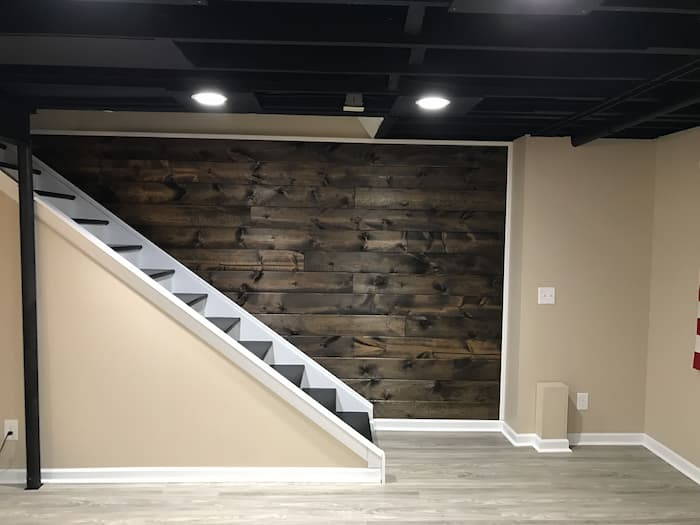
Best Finishes for Basement Stairs
The best finish for a wooden basement staircase is painting. Use a high-quality porch and floor enamel for the treads and risers, and for the railings, acrylic enamel. Paint is DIY-friendly and provides exceptional resistance to moisture, mold, and foot traffic. Color options also provide you with design versatility. Repaint as the paint deteriorates, or you grow weary of the color. Two or three clear polyurethane coatings offer good protection and bring out the natural wood tones in oak or fir treads and railings. While certain finishing methods are more difficult, most are still do-it-yourself-friendly.
- Carpet: You can carpet each tread and paint the risers, or extend a single runner the entire length of the staircase and fasten it with tacks or tack strips. Either way, you must paint the exposed steps and railing pieces or cover them with a clear finish.
- Hardwood: It makes sense to install engineered wood flooring on the stairs if you have it in the basement. It is fine to assign this task to experts for flooring installation.
- Luxury Vinyl: Luxury vinyl flooring is a fantastic option for a basement floor. It can also be installed on staircases, but the treads must be glued to keep it from coming off. You’ll also need to install nosing, which is available from most flooring suppliers if you choose to do this.
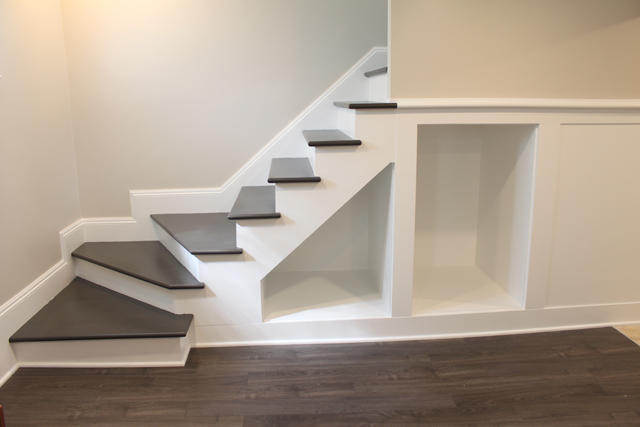
The Idea for Basement Stairs
As different people use basement stairs, Below are the perfect design options can be used:
Matching Color Paints
The railing has a clear finish to highlight the natural wood feature, and the treads are painted a light gray to match the tile on the basement floor.
Plush Carpet
This wall-protected staircase has the same carpet as the basement floor, making the transition between floors comfortable for bare feet.
Easy Utility Procedures
Nothing extravagant is required for this useful basement in working on how to finish basement stairs. The staircase’s whole structure is painted to shield the wood from dampness.
A Little Hardwood
Are basement stairs made of hardwood? Exactly why not? Be cautious to only utilize products developed for below-grade installations for refinishing basement stairs.
Conclusion
We have provided you with the best insights in this blog for how to finish basement stairs. Therefore, create yours wisely. It is preferable to be cautious and cost-effective while dealing with basement stairs. So, we hope all this stuff will work best for you.
Read some more useful articles:
How to finish basement with french drain
